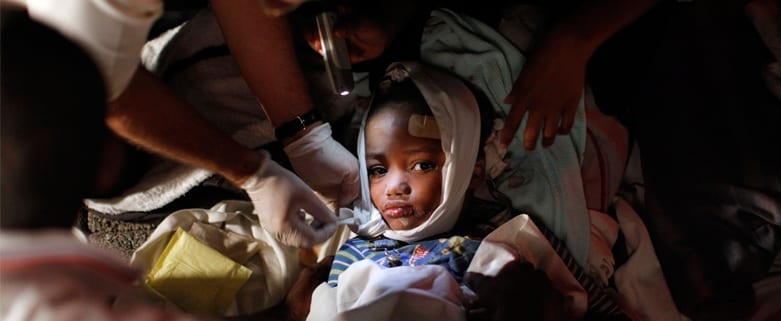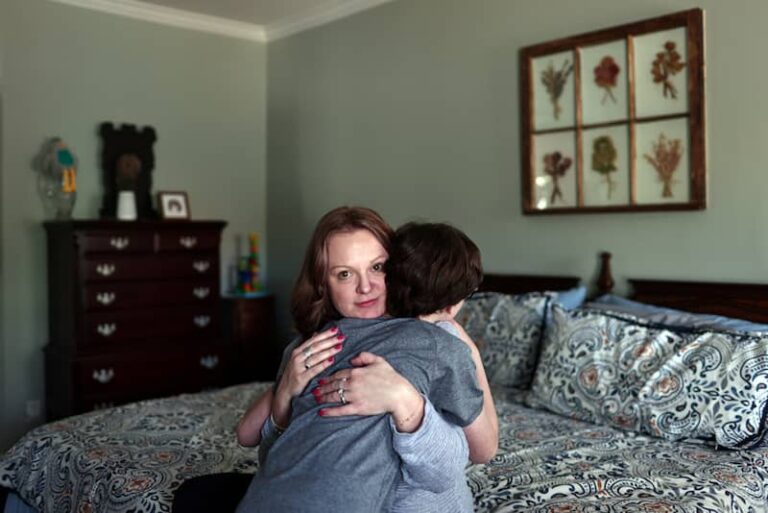People have pulled bodies from collapsed homes, covering them with sheets by the side of the road, and passers-by are lifting the sheets to see if their loved ones are underneath.
People covered in concrete dust have clawed their way out of the debris, wailing, and others are wandering through the streets stunned.
Thousands have gathered in public squares, holding hands and singing hymns, while others use their bare hands to scratch through the rubble to look for survivors.
As he toured the devastated capital Port-au-Prince overnight Prime Minister Jean Max Bellerive said the death toll could be enormous.
“I believe that we are well over 100,000,” he said.
“I’ve seen so many buildings, so many neighbourhoods totally destroyed, and in some neighbourhoods we don’t even see people,” he said.
However Mr Bellerive says so far, law and order is under control.
President Rene Preval has described stepping over dead bodies and hearing the cries of those trapped inside the collapsed Parliament, where the senate president was among those pinned under the wreckage.
“Parliament has collapsed. The tax office has collapsed. Schools have collapsed. Hospitals have collapsed,” he added.
“There are a lot of schools that have a lot of dead people in them,” he told the Miami Herald. “All of the hospitals are packed with people. It is a catastrophe.”
Even the presidential palace and the capital’s main prison have turned to rubble.
The United Nations says its peacekeeping headquarters have also been destroyed and more than 100 of its staff are missing.
Mr Preval confirmed that UN mission chief Hedi Annabi was among the dead.
Aftershocks have continued to rock the country as Haitians, many afraid to return to their homes, come to terms with the scale of the disaster.
The quake’s epicentre was only 16 kilometres from the capital Port-au-Prince. About 4 million people live in the city and surrounding area.
The 7.0-magnitude quake was the most powerful to hit Haiti in more than 200 years, according to the US Geological Survey.
The International Red Cross in Geneva has warned that with roads blocked and almost all communication lines down, it is extremely difficult to accurately assess the situation in Haiti.
It believes up to 3 million people could be homeless, injured or dead.
An American nurse in Port au Prince, Kezia Furth, says she is trying to help the injured.
“I’m trying to take care of them, trying to get them stabilised – but it’s hard, I have very little equipment,” she said.
‘Unwavering support’
US President Barack Obama has vowed “unwavering support” to help Haiti recover from the devastating earthquake.
Mr Obama told reporters he had directed his administration to provide swift, coordinated help to save lives.
“This morning I want to extend to the people of Haiti the deep condolences and unwavering support of the American people following yesterday’s terrible earthquake,” he said.
“We are just now beginning to learn the extent of the devastation, but the reports and images that we’ve seen of collapsed hospitals, crumbled homes and men and women carrying their injured neighbours through the streets are truly heart-wrenching.
“I have directed my administration to respond with a swift, coordinated and aggressive effort to save lives.
“The people of Haiti will have the full support of the United States in the urgent effort to rescue those trapped beneath the rubble and to deliver the humanitarian relief – the food, water and medicine – that Haitians will need in the coming days,” he said.
A late-night White House meeting involving various arms of the government took place to coordinate the US response. The State Department urged Americans not to travel to Haiti.
In Geneva, UN officials said they expected the world body would issue an international emergency appeal for funds and other assistance for Haiti in the next few days, once needs on the ground had been assessed.
Germany was sending 1 million euros in immediate aid, Foreign Minister Guido Westerwelle said, adding “I’m shocked by the dimensions of the earthquake disaster in Haiti.”
The Inter-American Development Bank said it would provide $200,000 in immediate aid. The World Bank, which said its local offices were destroyed but most staff were safe, planned to send a team to help assess damage and plan a recovery.
The US Coast Guard said it was sending cutters and aircraft close to Haiti to give humanitarian assistance. The United States, Britain, Canada and France were sending reconnaissance and rescue teams, some with search dogs and heavy equipment.
UN casualties
The UN’s response to the disaster has been hampered after its headquarters were brought down in the quake, killing its mission chief and many of his colleagues.
French Foreign Minister Bernard Kouchner said he feared everyone in the UN building was killed when it collapsed.
UN Secretary-General Ban Ki-moon said about 100-150 people were in the building when the quake struck.
The UN mission, known as MINUSTAH, was headquartered in the former Christopher Hotel in Port-au-Prince, where administrative staff worked. Most of MINUSTAH’s 9,000 troops and police were located elsewhere.
Eleven Brazilian soldiers from the mission were killed, Brazil’s army said in a statement.
General Carlos Barcellos said in an earlier news conference in the capital Brasilia that many Brazilian soldiers were also missing and that large numbers of civilians have moved toward military bases in search of humanitarian aid.
Brazil leads the UN peacekeeping force deployed to the poor Caribbean nation in 2004 after a rebellion by gangs and former soldiers forced elected Haitian President Jean-Bertrand Aristide into exile.
The poorest country in the Western Hemisphere, Haiti is ill-equipped to respond to such a disaster, lacking heavy equipment to move debris and sufficient emergency personnel.
2009 Australian Broadcasting Corporation. All Rights Reserved.







